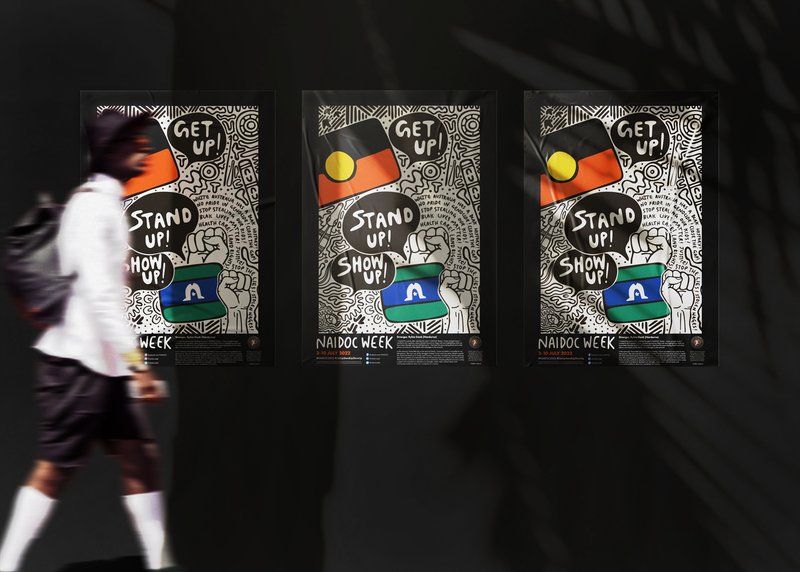Get Up! Stand Up! Show Up! #NAIDOC2022
Join NAVA in supporting and engaging with your local Aboriginal and/or Torres Strait Islander communities through activities and events held across the country, making a donation, and buying First Nations arts.
Join NAVA in supporting and engaging with your local Aboriginal and/or Torres Strait Islander communities through activities and events held across the country, making a donation, and buying First Nations arts.

Image description: A person is walking in front of three large official NAIDOC Week 2022posters by Ryhia Dank, a young Gudanji/Wakaja artist from the Northern Territory. The posters are digitally hand drawn in black and white – with the exclusion of the Aboriginal and Torres Strait Islander flags which are in colour. Two raised fists are prominent among the words including Blak Lives Matter, White Australia has a Blak History, Stolen Wages, Land Rights and the theme of this year’s NAIDOC Week, Get Up! Stand Up! Show Up! The posters are pasted up on a black wall.
NAIDOC Week, held from 3-10 July 2022, is an opportunity for all of us to learn about First Nations cultures and histories and participate in celebrations of the oldest, continuous living cultures on Earth. This year’s theme ‘Get Up! Stand Up! Show Up!’ challenges us to commit to systemic change and rally around Aboriginal and/or Torres Strait Islander Elders and communities.
The NAIDOC Week website reminds us that ‘Getting Up, Standing Up, and Showing Up can take many forms. We need to move beyond just acknowledgement, good intentions, empty words and promises, and hollow commitments. Enough is enough.’
‘Whether it’s seeking proper environmental, cultural and heritage protections, Constitutional change, a comprehensive process of truth-telling, working towards treaties, or calling out racism—we must do it together.’
Join NAVA in supporting and engaging with your local Aboriginal and/or Torres Strait Islander communities through activities and events held across the country, making a donation and buying the work of First Nations practitioners.
NAVA’s work has been enriched by learnings from our recent consultations as part of revising the Code of Practice for the Professional Australian Visual Arts, Craft and Design Sector. Discussions consistently came back to the practice of care, investing in a diversity of voices across Aboriginal and Torres Strait Islander communities, the critical nature of informed consent and allowing time and space for people to consider and contribute.
The new Code opens with a section on First Nations which leads the Principles, Ethics and Rights chapter. This new introductory section bolsters the ethical framework of the Code and provides the sector with guidance on areas such as Indigenous Cultural and Intellectual Property (ICIP), consultation practices, self-determination, cultural safety, employment and Reconciliation Action Plans.
The feedback received through our consultations has also formed the development of another new section titled Working with Art Centres. This section aims to provide relevant and useful recommendations for what non-Indigenous individuals and organisations should consider, understand and be sensitive to when proposing and engaging in collaborations, projects and partnerships with art centres. The draft of this new section is currently undergoing review by the art centre peak bodies, key service organisations and the art centres who participated in the consultations.
NAVA’s new Code of Practice is due to be released in September this year.
The Albanese government has made a commitment to deliver a new national cultural policy by the end of 2022 that puts First Nations arts and culture at the centre.
In upcoming public consultations over the next few months, NAVA will join First Nations arts organisations and Australian arts peak bodies to ensure this includes centreing the principles of First Nations self-determination and story sovereignty, and working alongside our First Nations colleagues to support First Nations culture bearers, artists and organisations, communities, and knowledges across Australia.
In consulting with First Nations colleagues and the visual arts roundtable, NAVA is amending the recommendations to government as part of our Put First Nations First advocacy priority:
We are currently asking for feedback from First Nations artists, arts workers and organisations.
Is there anything missing from our recommendations that you like the government to include in the national cultural plan? Please fill out this short feedback survey, email nava@visualarts.net.au, or freecall 1800 046 282.
Shop from Aboriginal and Torres Strait Islander owned businesses and Aboriginal Art Centres. Visit Welcome to Country for a list of more than 40 incredible businesses to choose from. Visit the peak bodies for links to the art centres they represent.
Upcoming art fairs
NAVA acknowledges the Gadigal, Wangal, Dharug, Dharawal, Kaurna, Ngunnawal, Ngambri and Dja Dja Wurrung peoples as the Traditional Custodians and knowledge-holders of the unceded lands on which we live, learn and work.
We acknowledge Aboriginal and Torres Strait Islander peoples as the first artists and storytellers on this continent, and pay our respects to Elders past, present and future.
Sovereignty was never ceded. Always was, always will be Aboriginal land.